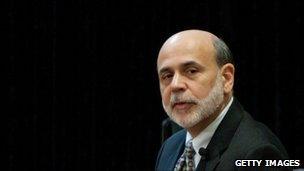Bernanke fears slow US recovery
- Published

Mr Bernanke defended the Fed's quantitative easing programme
The US economy is showing signs of a "self-sustaining recovery", but is not growing fast enough to reduce high jobless levels, Federal Reserve chairman Ben Bernanke has said.
Mr Bernanke told the Senate Budget Committee it could take four to five years for the job market to normalise.
As well as unemployment, he said low inflation was also a concern.
"Very low inflation increases the risk that new adverse shocks could push the economy into deflation," he said.
Mr Bernanke was speaking shortly after the release of Labor Department figures showing that the US unemployment rate dropped to 9.4% in December from 9.8% in November, the biggest one-month drop since April 1998.
His comments and the more positive jobs data initially caused share prices to rise.
However, the lower rate came not only because more people found jobs, but also because 260,000 had given up looking and had therefore disappeared from the jobless total.
In later trading on Wall Street shares fell below their opening level.
'Modest' job growth
"We have seen increased evidence that a self-sustaining recovery in consumer and business spending may be taking hold," Mr Bernanke told the committee.
However, the labour market had improved "only modestly at best", he added.
"Persistently high unemployment, by damping household income and confidence, could threaten the strength and sustainability of the recovery," he continued.
At the same time, inflation was likely to remain "subdued" for some time.
Federal Reserve Governor, Elizabeth Duke, said there was a "lot of slack" in the US economy and the government still needed to support recovery.
"My view would be that we need to have a credible plan for reducing the debt and the deficits over the long run, but not in the immediate time frame. In the immediate time frame, we still need to support a recovery that's just getting started."
'Critical threat'
Mr Bernanke said continuing high unemployment and low inflation had prompted the Fed's decision to purchase another $600bn (£385bn) of US government debt in a bid to stimulate the US economy.
He said the asset purchase scheme was "not comparable to ordinary government spending" and warned that the federal government's huge budget deficit put it on "an unsustainable fiscal path".
He called on Congress to address "this critical threat to our economy".
"Doing nothing will not be an option indefinitely," he said. "The longer we wait to act, the greater the risks and the more wrenching the inevitable changes to the budget will be."
However, Mr Bernanke gave no indication whether there would be further buying beyond this scheme.
Lena Komileva, economist at Tullett Prebon, said: "The Fed will not rush for the exit. The potential for further (easing) remains if weak labour and housing activity continue to depress inflation trends."